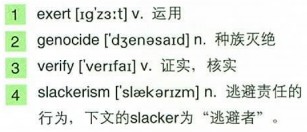美式发音 适合泛听
 Host: You write, “The amount of energy that had been 1)exerted by the Twitterati to save the now-infamous Balloon Boy would probably be enough to prevent at least a few dozen African 2)genocides.” How do you figure that?
Host: You write, “The amount of energy that had been 1)exerted by the Twitterati to save the now-infamous Balloon Boy would probably be enough to prevent at least a few dozen African 2)genocides.” How do you figure that?
Evgeny Morozov (Researcher at Harvard University): Well, I mean, if you look at the most popular topics discussed on Twitter at the end of last week, they actually, the Balloon Boy dominated pretty much everything. You know, it dominated politics, it dominated health care, it dominated everything else. More than that, you actually had a particular campaign before it turned out that the boy was actually hiding and was not [in] the balloon. There was actually a campaign on Twitter to try to save him, to try to influence events.
And the ease with which now it is possible to form these issue groups. It of course could be extremely good and productive, as we’ve seen with events in Iran, for example, you know, earlier this year. But sometimes I think these people go a little bit too far and they start campaigning on issues before actually thinking them through and 3)verifying that the problem actually exists.
And I think that it just creates this almost on-demand activism, where, you know, whenever you feel bad about the world, you can actually get involved for 30 seconds, join the Facebook group or sign an online petition.
Host: But what’s so terrible? What’s so terrible about getting involved for...30 seconds, if perhaps 30 seconds is enough to achieve an outcome?
Evgeny: Yes. Well, the question is, does it actually achieve an outcome? And my understanding has been that, in many cases, it’s all just about making you feel good, this notion of 4)slackerism where you are still a slacker without actually getting involved, you know, depth. But you also kind of, you know, visibly, you are doing something. All your friends see that you’re involved, but your involvement is for those purposes only. It’s only to impress your friends, to impress your Facebook community, to impress your Twitter followers, while the actual impact is very minimal.
My favorite example is this campaign to Feed the Children of Africa on Facebook. If you look at it, it has 1.2 million members. And then you actually look at what those members have done, it’s just raising $6,000 which is, you know, less than half a cent per person. And then, of course, having this mass of people, you could probably involve them in much better and more productive ways.
Host: What are you saying? Are you saying that people who—if they’re going to put themselves out there, they should take the time to educate themselves or to put in some front-end time to...
Evgeny: Well...
Host: ...decide if they’re really doing the right thing? They obviously think they are doing the right thing.
Evgeny: Of course. I mean, that definitely wouldn’t hurt. I mean, I think educating yourself about a cause before you take it on is a good piece of advice for any campaigner, right? Because what we do see happen in many cases is that people join nonexistent causes. There was this very interesting campaign in Europe, in Denmark, earlier this year, where 28,000 people signed up to save a fountain in Denmark who nobody was threatening. So, it was just a hoax. Someone set up this imaginary cause and 28,000 people went for it, right? And again, it proves that we have to be a little bit more careful when we are choosing which campaigns to join.

主持人:你写道,“推特网狂人们用来拯救臭名昭著的‘气球男孩’的精力很可能足以制止至少好几十次非洲种族灭绝事件的发生。”你是怎么得出这个结论的?
耶夫根尼·莫洛佐夫(哈佛大学研究员):呃,我的意思是说,如果你看看上周结束时在推特网上最热门的话题,“气球男孩”确实主宰了一切。你知道吧,它主宰了政治,主宰了医疗保健,主宰了其他的所有领域。更甚之,在那个小男孩被发现是自己藏了起来,并不在气球上之前,居然有人发起了一次特殊活动。在推特网上竟然有一个这样的运动去拯救他,试图影响事件发展的走向。
如今想组成这些议题团体很容易。当然,它也益处良多,而且很有效。比如说,我们看看今年(2009年)早些时候发生在伊朗的事就知道了。但有的时候,我觉得有些人做得过火了。他们还没有考虑清楚,没有核实问题是否真的存在就开始组织议题活动了。
另外,我觉得这种做法只不过是形成一种即时行动主义。也就是说,在某个时候你对这个世界感到歉疚,你马上就可以花30秒的时间参与其中,加入脸谱网的一个团体,或者加入某个在线的请愿活动。
主持人:可这样做就那么糟吗?花30秒参与其中真的那么糟吗?说不定30秒就足以得到一个结果呢?
耶夫根尼:对。问题是,那真的会有一个结果吗?据我所知,在很多时候,人们这样做的目的只是想让自己好受一点而已。其实这种逃避的行为意味着没有深度介入,说到底你还是一个逃避者。可你也同时在很张扬地做着些什么。你所有的朋友都看到你介入了,但你的介入也只是为了这些目的,就是为了给朋友留下好印象,给你所在的脸谱网群体留下好印象,给你的推特网粉丝留下好印象,但实际效果却是微不足道的。
我最喜欢用的例子就是在脸谱网上有一个给非洲儿童提供食物的活动。如果你上去看一下,会发现上面有一百二十万名成员。然后你再仔细研究他们的成果,所募的金额也只不过是六千美元而已。你也明白,也就是说,每人贡献了不到半美分。其实呢,有这么大的一群人,你可以让他们做更多、更有建设性的事。
主持人:你这是什么意思?你是在说如果人们想出一份力,他们应该先花点时间了解情况,事先花点时间……
耶夫根尼:呃……
主持人:再来决定自己是不是该参与?他们显然觉得自己做的是对的。
耶夫根尼:当然应该这样。我是说,这么做只会有好处。我的意思是你在投身一项运动之前让自己先了解情况,这对任何参与者来说都是一个好建议,对吧?因为我们很多时候会看到人们会为一些不存在的事件瞎忙。今年(2009年)早些时候,在欧洲的丹麦有一个很有意思的活动。有两万八千人参与了拯救丹麦的一个喷泉的活动,而事实上,根本就没有人想对这个喷泉怎么样。最终,那只是一个恶作剧。有人设下了这个凭空想象的局,两万八千人上当了,对吧?这又一次说明我们在选择参与哪个活动时,要多个心眼。
